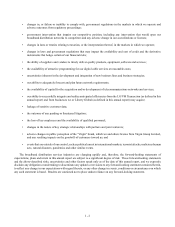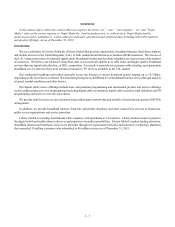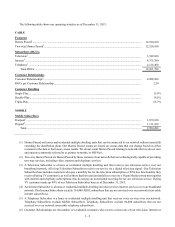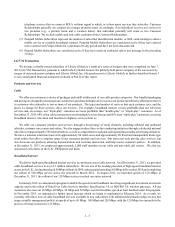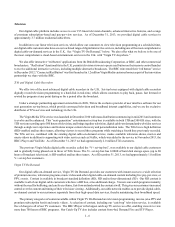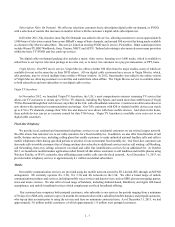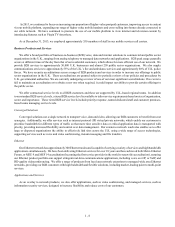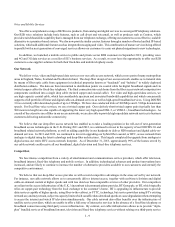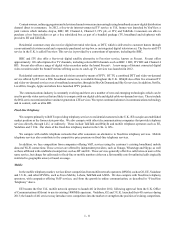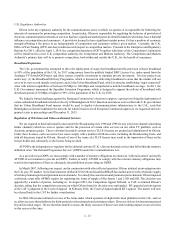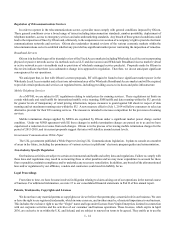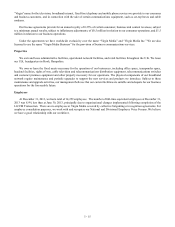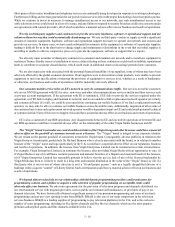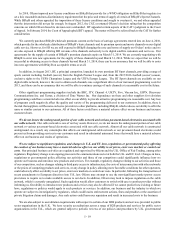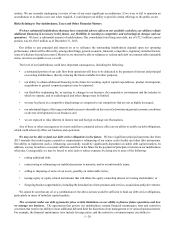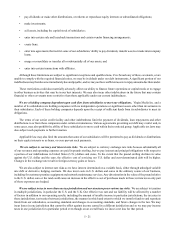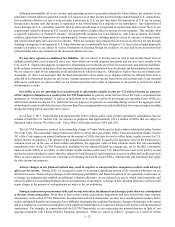Virgin Media 2013 Annual Report Download - page 14
Download and view the complete annual report
Please find page 14 of the 2013 Virgin Media annual report below. You can navigate through the pages in the report by either clicking on the pages listed below, or by using the keyword search tool below to find specific information within the annual report.I - 12
Business
The U.K. B2B telecommunications market is characterized by strong competition and ongoing consolidation. Competition
in the U.K. B2B telecommunications market continues to be value driven, with the key components being quality, reliability and
price.
We compete primarily with traditional network operators such as Vodafone UK, which acquired C&W Worldwide in July
2012, and BT. BT represents the main competitive threat nationally due to its network reach and product portfolio. Vodafone UK
is our only U.K. competitor to have both a fixed and mobile network to serve its B2B customers. We also compete with regional
providers, such as COLT Telecom Group plc, which have a strong network presence within limited geographic areas. Recently,
we have faced increasing competition from services provided by MNOs which target small B2B customers.
In the retail market our traditional competitors are becoming increasingly focused on particular segments of the market. For
example, Vodafone UK targets larger national and multi-national corporations. We continue to focus on small, medium and large
nationally oriented businesses and public sector organizations. System integrators, such as Kcom (formerly known as Kingston
Communications (Hull) plc), are also becoming an increasing competitive threat as large organizations continue to focus on
information technology integration, management and outsourcing.
Regulatory Matters
Overview
Legislative Framework
Our business activities are subject to the laws and regulations of the EU and the U.K. At an EU level we are regulated by a
variety of legal instruments and policies, collectively referred to as the “Regulatory Framework”, regulating the establishment and
operation of electronic communications networks, including cable television and traditional telephony networks, and the offer of
electronic communications services, such as telephony, internet and, to some degree, television services. The Regulatory
Framework does not generally address issues of content. The Regulatory Framework primarily seeks to open European markets
for communications services and is comprised of:
• Directive 2002/21 on a common regulatory framework for electronic communications networks and services;
• Directive 2002/20 on the authorization of electronic communications networks and services;
• Directive 2002/19 on access to, and interconnection of, electronic communications networks and associated facilities;
and
• Directive 2002/22 on universal service and users rights relating to electronic communications networks and services.
These Directives are supplemented by EU Directive 2002/58, concerning the processing of personal data and the protection
of privacy in the electronic communications sector.
In the U.K., the Regulatory Framework is implemented through (1) the Communications Act 2003 (the Communications Act)
which regulates all forms of communications technology, whether used for telecommunications or broadcasting, and (2) the Wireless
Telegraphy Act 2006, which regulates radio communications in the U.K. (including with respect to the spectrum, licensing
arrangements, usage conditions and charges, license bidding and trading and enforcement and penalties). The Privacy and Electronic
Communications Regulations 2003, as amended, implemented EU Directive 2002/58, regulating the processing of personal data
and the protection of privacy in the electronic communications sector.
We are also subject to regulation under the U.K. Broadcasting Acts 1990 and 1996 and other U.K. statutes and subordinate
legislation, including the Competition Act 1998 and the Enterprise Act 2002. On-demand programming is regulated by the Authority
for Television On-Demand (ATVOD) under a co-regulatory regime with Ofcom. The regulatory regime for on-demand
programming is derived from the Audiovisual Media Services Directive.


